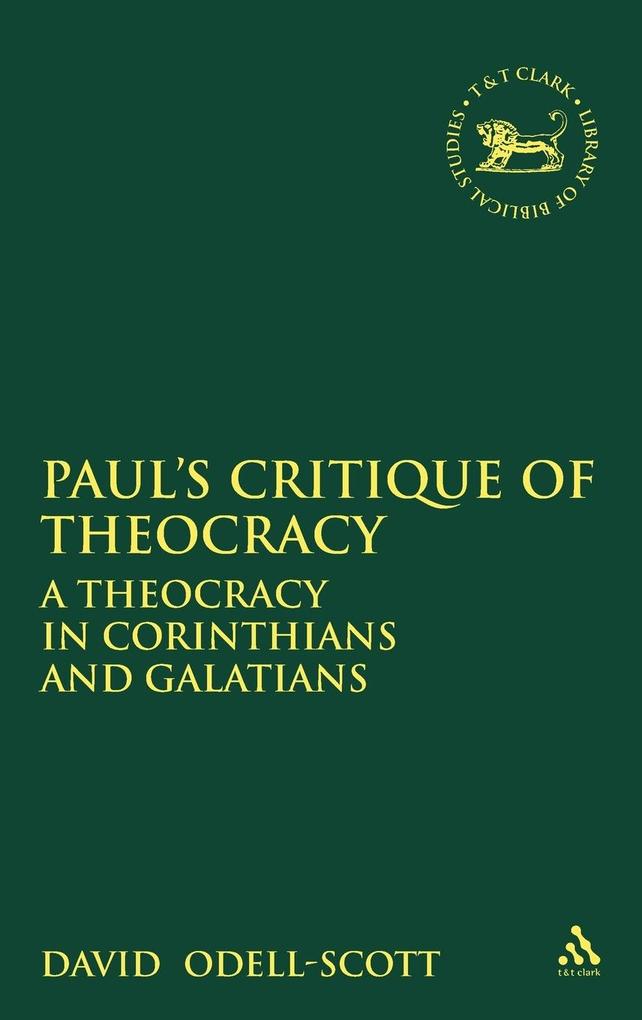
Zustellung: Di, 12.08. - Fr, 15.08.
Versand in 7 Tagen
VersandkostenfreiBestellen & in Filiale abholen:
Paul's Critique of Theocracy offers an interpretation of select texts in Corinthians and Galatians concerned with the establishment of legitimate authority in the Christian community. Odell-Scott argues that for Paul, no one may boast that they are selected by God, and no one has the authority to rule as God's representative.
Paul also criticizes those who exhibit a superior "sacredness" over other community members. Contrary to most scholarly views, Odell-Scott argues that Paul is not taking sides in a debate about the proper authority structure. Rather, he criticizes any notion of such a structure, opposing it with his metaphor of the Church as the body of Christ and the "sacred family" of God. The exegesis is also sketched out in a postmodern framework criticizing hierarchy through differentiation.
Paul also criticizes those who exhibit a superior "sacredness" over other community members. Contrary to most scholarly views, Odell-Scott argues that Paul is not taking sides in a debate about the proper authority structure. Rather, he criticizes any notion of such a structure, opposing it with his metaphor of the Church as the body of Christ and the "sacred family" of God. The exegesis is also sketched out in a postmodern framework criticizing hierarchy through differentiation.
Inhaltsverzeichnis
Chapter 1 Emptying Hierarchy
Part 1 De/Constructing the Church
Chapter 2 De/Credo
Chapter 3 A/Eugeneis
Chapter 4 Christ Crucified and the Emptiness of Theocracy
Part II De/Secration
Chapter 5 Tensions in the Textus, Conflicts in the Corpus
Chapter 6 A Sacred Critique of Reconciliation
Chapter 7 Patriarchal Promise
Chapter 8 De/Secration
Chapter 9 Sacred Deceptions: Sacred Destruction
Chapter 10 An A/Theocratic Conclusion
Part 1 De/Constructing the Church
Chapter 2 De/Credo
Chapter 3 A/Eugeneis
Chapter 4 Christ Crucified and the Emptiness of Theocracy
Part II De/Secration
Chapter 5 Tensions in the Textus, Conflicts in the Corpus
Chapter 6 A Sacred Critique of Reconciliation
Chapter 7 Patriarchal Promise
Chapter 8 De/Secration
Chapter 9 Sacred Deceptions: Sacred Destruction
Chapter 10 An A/Theocratic Conclusion
Produktdetails
Erscheinungsdatum
01. September 2003
Sprache
englisch
Untertitel
A Theocracy in Corinthians and Galatians.
Sprache: Englisch.
Seitenanzahl
198
Autor/Autorin
David W. Odell-Scott
Verlag/Hersteller
Produktart
gebunden
Gewicht
467 g
Größe (L/B/H)
240/161/15 mm
ISBN
9780826469663
Entdecken Sie mehr
Bewertungen
0 Bewertungen
Es wurden noch keine Bewertungen abgegeben. Schreiben Sie die erste Bewertung zu "Paul's Critique of Theocracy" und helfen Sie damit anderen bei der Kaufentscheidung.










